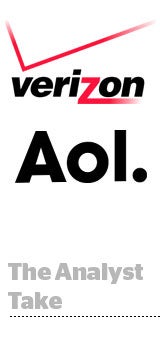 We’re breaking with Marketer’s Note tradition this week to bring you our collective thoughts on the biggest news of last week.
We’re breaking with Marketer’s Note tradition this week to bring you our collective thoughts on the biggest news of last week.
While the press release and countless interviews focused on a “mobile-first” strategy, we think there’s far more to the story than a simple pairing of AOL’s digital advertising platforms – arguably No. 3 in the industry behind Google and Facebook – with one of the United States’ largest wireless providers.
Here are AdExchanger Research’s thoughts, predictions and analyses of Verizon’s acquisition of AOL.
It’s About Ad Tech, Not HuffPo
AOL, over the last several years, has been stealthily moving from display advertising 1.0 stalwart to ad tech powerhouse, building and buying its way into an advertising technology stack to rival those of Google and Facebook, now offering – among other things – ad serving, a buy/sell-side marketplace for a range of digital channels and inventory types (both programmatic and not), smart optimization capabilities and advanced attribution.
And, along the way, AOL has positioned itself as the “open” alternative to the other guys, who are increasingly seen as perpetuating the “walled garden” problem in an era where data ubiquity and connectivity are the keys to the kingdom. Good on Verizon for seeing the opportunity to buy instant access to the digital advertising ecosystem via a scaled distribution platform powered by lots and lots of data.
But Speaking of the Content…Why Are We Speaking of the Content?
So much coverage of this merger has focused on the millions of unique visitors and billions of combined page views AOL commands. But a large number of industry observers also believe Verizon will end up selling the content arm of AOL anyway, which would make these billions completely irrelevant. And with irrelevance comes questions about AOL’s content marketing operations.
In our view, Verizon should carefully consider the content marketing equation before offloading its content operation. Through Huffington Post and its sibling media brands, AOL has content studios that create valuable custom programs for marketers. The newly combined company will potentially appeal to even more content marketers because of the vast reach of its platform and the breadth of its data, but a content studio without the editorial skills that currently live within AOL’s media brands will be largely impotent.
Verizon Poised To “Win” Data-Driven TV, Unless Others Follow Its Lead
As the television industry faces massive disruption in the form of changing user behavior – where a huge range of alternative platforms and devices are now used to consume “television” content – the big guys across cable and telco should be asking themselves, “What is our future in a dynamic, personalized, addressable world?”
Verizon, for its part, clearly saw the writing on the wall. Sustainability (let alone competitive advantage) will come via the delivery of smart, personalized, multiplatform experiences, not just providing dumb pipes – and there are a host of unexpected competitors clambering at the gates. As LUMA Partners’ Brian Andersen recently told us, “[What’s] interesting is looking at companies who are entering the market – Google, Apple, Amazon, Samsung and Netflix. The market cap and presence of these guys is much greater than the whole traditional TV ecosystem. They will create the most disruption.”
Buying AOL instantly gets Verizon a meaningful understanding of, and foothold in, the programmatic video space – one which is increasingly co-mingling with the programmatic TV space, not to mention over-the-top capabilities – through AOL’s 2013 acquisition of video platform Adap.TV.
It begs the question – who’s next? Does Comcast buy Turn? Will DirecTV acquire TubeMogul?
A Deterministic Cross-Device Play is Obvious. A Probabilistic One is More Interesting
It’s true that the deal signals a major development in the race for the largest and most interoperable deterministic data set. Verizon, by combining its massive known user base across mobile, Internet, and cable with AOL’s user data and ad technology stack, presents a formidable competitor to Facebook and Google’s deterministic sets and offers the ability to serve targeted ads across multiple devices.
But, as others have noted, Verizon has already made a couple of highly publicized missteps into the world of mobile and cross-device targeting in the form of privacy violations. Having recently rolled out the zombie cookie kill switch, we wonder if Verizon is considering using its known user base to enhance AOL’s existing probabilistic cross-device targeting offering, rather than the other way around. Perhaps this acquisition will result in a true deterministic/probabilistic hybrid solution in which accuracy is improved and measurable thanks to a very large – and very encrypted – known data set at a scale that will rival the deterministic big guys and still avoid walled garden syndrome.
The Train To Acquisition City Is Now Boarding
Whether any of these predictions come true, one thing seems inevitable: This acquisition will usher in a new ad tech buying frenzy. In the past few years we’ve seen an accelerating convergence of ad tech and marketing tech with large technology companies rounding out their offerings with advertising platforms. But the next wave will be looking toward the future of the connected world rather than the future of connected marketing. If you’re in the ad tech industry, look for your next courtiers to come from telcos, cable operators and media conglomerates rather than entrenched technology behemoths.
For the rest of us: Get your tickets now for what’s sure to be a battle royale when tech and media go head-to-head in a bidding war for the best ad tech players.













